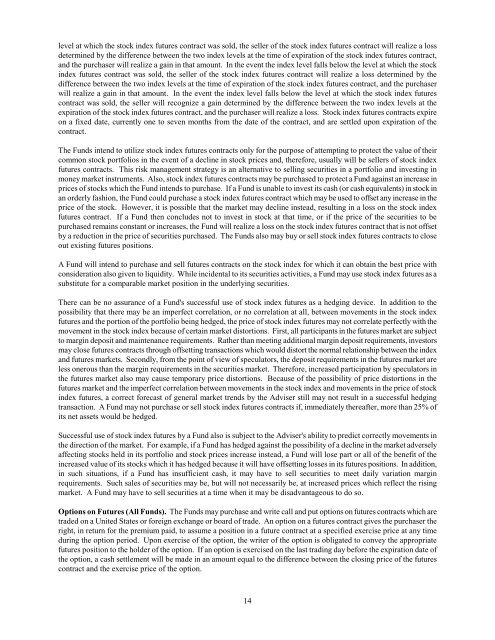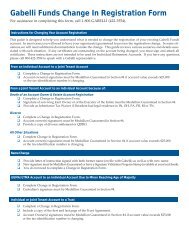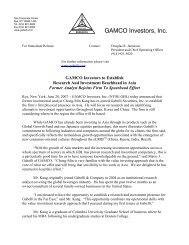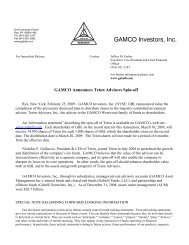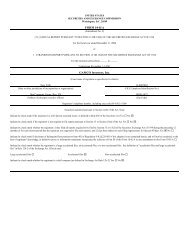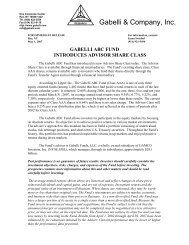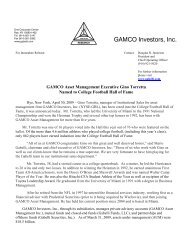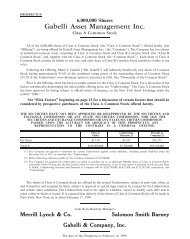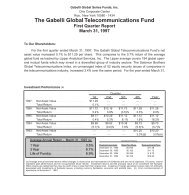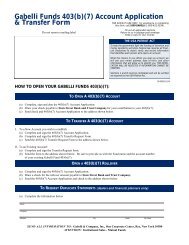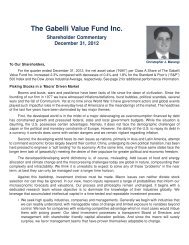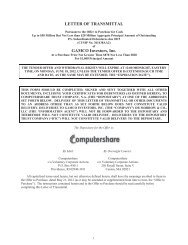Statement of Additional Info - Gabelli
Statement of Additional Info - Gabelli
Statement of Additional Info - Gabelli
You also want an ePaper? Increase the reach of your titles
YUMPU automatically turns print PDFs into web optimized ePapers that Google loves.
level at which the stock index futures contract was sold, the seller <strong>of</strong> the stock index futures contract will realize a loss<br />
determined by the difference between the two index levels at the time <strong>of</strong> expiration <strong>of</strong> the stock index futures contract,<br />
and the purchaser will realize a gain in that amount. In the event the index level falls below the level at which the stock<br />
index futures contract was sold, the seller <strong>of</strong> the stock index futures contract will realize a loss determined by the<br />
difference between the two index levels at the time <strong>of</strong> expiration <strong>of</strong> the stock index futures contract, and the purchaser<br />
will realize a gain in that amount. In the event the index level falls below the level at which the stock index futures<br />
contract was sold, the seller will recognize a gain determined by the difference between the two index levels at the<br />
expiration <strong>of</strong> the stock index futures contract, and the purchaser will realize a loss. Stock index futures contracts expire<br />
on a fixed date, currently one to seven months from the date <strong>of</strong> the contract, and are settled upon expiration <strong>of</strong> the<br />
contract.<br />
The Funds intend to utilize stock index futures contracts only for the purpose <strong>of</strong> attempting to protect the value <strong>of</strong> their<br />
common stock portfolios in the event <strong>of</strong> a decline in stock prices and, therefore, usually will be sellers <strong>of</strong> stock index<br />
futures contracts. This risk management strategy is an alternative to selling securities in a portfolio and investing in<br />
money market instruments. Also, stock index futures contracts may be purchased to protect a Fund against an increase in<br />
prices <strong>of</strong> stocks which the Fund intends to purchase. If a Fund is unable to invest its cash (or cash equivalents) in stock in<br />
an orderly fashion, the Fund could purchase a stock index futures contract which may be used to <strong>of</strong>fset any increase in the<br />
price <strong>of</strong> the stock. However, it is possible that the market may decline instead, resulting in a loss on the stock index<br />
futures contract. If a Fund then concludes not to invest in stock at that time, or if the price <strong>of</strong> the securities to be<br />
purchased remains constant or increases, the Fund will realize a loss on the stock index futures contract that is not <strong>of</strong>fset<br />
by a reduction in the price <strong>of</strong> securities purchased. The Funds also may buy or sell stock index futures contracts to close<br />
out existing futures positions.<br />
A Fund will intend to purchase and sell futures contracts on the stock index for which it can obtain the best price with<br />
consideration also given to liquidity. While incidental to its securities activities, a Fund may use stock index futures as a<br />
substitute for a comparable market position in the underlying securities.<br />
There can be no assurance <strong>of</strong> a Fund's successful use <strong>of</strong> stock index futures as a hedging device. In addition to the<br />
possibility that there may be an imperfect correlation, or no correlation at all, between movements in the stock index<br />
futures and the portion <strong>of</strong> the portfolio being hedged, the price <strong>of</strong> stock index futures may not correlate perfectly with the<br />
movement in the stock index because <strong>of</strong> certain market distortions. First, all participants in the futures market are subject<br />
to margin deposit and maintenance requirements. Rather than meeting additional margin deposit requirements, investors<br />
may close futures contracts through <strong>of</strong>fsetting transactions which would distort the normal relationship between the index<br />
and futures markets. Secondly, from the point <strong>of</strong> view <strong>of</strong> speculators, the deposit requirements in the futures market are<br />
less onerous than the margin requirements in the securities market. Therefore, increased participation by speculators in<br />
the futures market also may cause temporary price distortions. Because <strong>of</strong> the possibility <strong>of</strong> price distortions in the<br />
futures market and the imperfect correlation between movements in the stock index and movements in the price <strong>of</strong> stock<br />
index futures, a correct forecast <strong>of</strong> general market trends by the Adviser still may not result in a successful hedging<br />
transaction. A Fund may not purchase or sell stock index futures contracts if, immediately thereafter, more than 25% <strong>of</strong><br />
its net assets would be hedged.<br />
Successful use <strong>of</strong> stock index futures by a Fund also is subject to the Adviser's ability to predict correctly movements in<br />
the direction <strong>of</strong> the market. For example, if a Fund has hedged against the possibility <strong>of</strong> a decline in the market adversely<br />
affecting stocks held in its portfolio and stock prices increase instead, a Fund will lose part or all <strong>of</strong> the benefit <strong>of</strong> the<br />
increased value <strong>of</strong> its stocks which it has hedged because it will have <strong>of</strong>fsetting losses in its futures positions. In addition,<br />
in such situations, if a Fund has insufficient cash, it may have to sell securities to meet daily variation margin<br />
requirements. Such sales <strong>of</strong> securities may be, but will not necessarily be, at increased prices which reflect the rising<br />
market. A Fund may have to sell securities at a time when it may be disadvantageous to do so.<br />
Options on Futures (All Funds). The Funds may purchase and write call and put options on futures contracts which are<br />
traded on a United States or foreign exchange or board <strong>of</strong> trade. An option on a futures contract gives the purchaser the<br />
right, in return for the premium paid, to assume a position in a future contract at a specified exercise price at any time<br />
during the option period. Upon exercise <strong>of</strong> the option, the writer <strong>of</strong> the option is obligated to convey the appropriate<br />
futures position to the holder <strong>of</strong> the option. If an option is exercised on the last trading day before the expiration date <strong>of</strong><br />
the option, a cash settlement will be made in an amount equal to the difference between the closing price <strong>of</strong> the futures<br />
contract and the exercise price <strong>of</strong> the option.<br />
14


